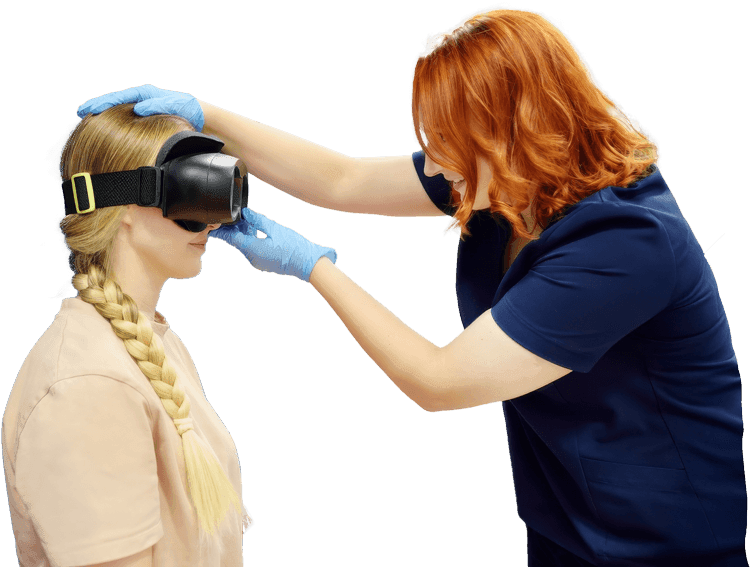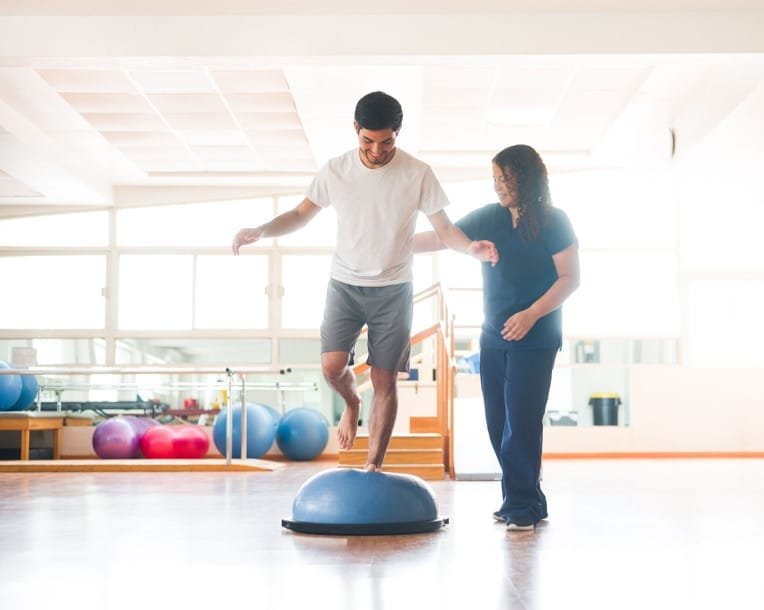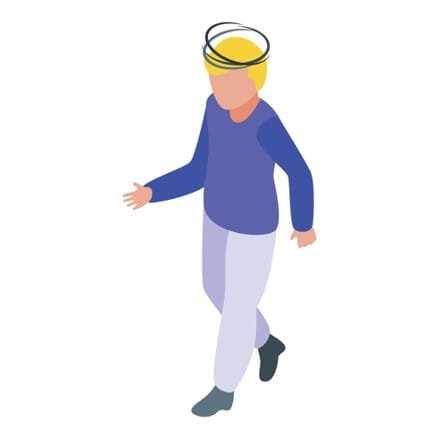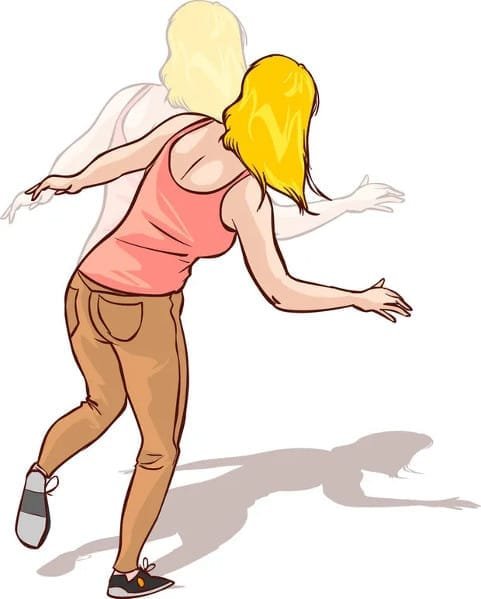Phobic Postural Vertigo (PPV)
Phobic postural vertigo (FPV) is a type of dizziness (vertigo) and a feeling of imbalance, often triggered by psychological factors. It occurs without an organic cause and can affect a person’s quality of life.

Discover the True Cause of Your Vertigo!
Understanding the source of dizziness and problems with your balance is the first step towards the right treatment. Book your appointment for an individualized assessment with our team of experts and regain your health.
What is Phobic Postural Vertigo (PPV)?
Phobic postural vertigo (PPV) is a type of dizziness (vertigo) and imbalance often triggered by psychological factors. It occurs without an organic cause and can significantly impact a person’s quality of life. PPV involves feelings of dizziness, imbalance, or fear of falling in specific situations or environments (e.g., open spaces, narrow corridors, crowded places). Typically, there is no organic dysfunction in the balance system, but psychological triggers play a significant role.
What Are the Symptoms of PPV?
- Sensation of imbalance or swaying
- Dizziness worsening in open spaces, at heights, or in crowded environments
- Fear of falling
- Avoidance of sudden movements or specific postures
- Anxiety and panic attack symptoms
- Symptoms varying in intensity throughout the day
What Causes PPV?
- Psychological factors: Associated with conditions like anxiety, depression, or obsessive-compulsive disorder.
- Past traumas: Previous falls, vertigo attacks, or traumatic events.
- After balance disorders: Fear developed following an episode of vertigo (e.g., BPPV or vestibular neuritis).
- Performance anxiety: Fear of embarrassment in social situations due to dizziness or falling.
How Is PPV Diagnosed?
- Detailed medical history: Understanding when and where the symptoms occur.
- Physical examination: Evaluating for any organic causes (e.g., inner ear problems).
- Psychological assessment: Screening for anxiety or other psychological disorders.
- Laboratory or imaging tests: Conducted to rule out other potential causes.
How Is PPV Treated?
Psychotherapy:
- Cognitive-behavioral therapy (CBT): Effective for managing anxiety and fear of falling.
- Exposure therapy: Gradual exposure to feared situations to reduce sensitivity.
Medication:
- Anxiolytics or antidepressants may alleviate symptoms.
Vestibular rehabilitation:
- Exercises designed to improve balance.
Relaxation techniques:
- Meditation, yoga, or breathing exercises to help manage stress.
Is PPV a Permanent Condition?
If untreated, PPV can persist for a long time. However, with appropriate treatment and support, symptoms can be significantly managed and controlled.
How Can I Cope with PPV?
- Instead of avoiding anxiety-inducing situations entirely, face them gradually in small steps.
- Engage in regular physical exercises to improve your sense of balance.
- Learn and practice relaxation techniques.
- Seek help from a psychologist or psychiatrist.
What Other Conditions Can Be Confused with PPV?
- BPPV (Benign Paroxysmal Positional Vertigo)
- Vestibular migraine
- Meniere’s disease
- Orthostatic hypotension
- Panic disorder
PPV differs from other types of vertigo because it arises without an organic cause and is typically triggered by psychological factors.

What Are the Triggers for PPV?
- Crowded places
- Open spaces
- Shopping malls
- Heights
- Reminders of traumatic events
How Does PPV Affect Life?
PPV can negatively impact daily life, work, and social relationships. However, these effects can be alleviated with proper treatment.
My paths crossed with Dr. Deniz because of my vocal cord polyp. My indecision before my doctor cost me 8 months. It didn't take us 8 minutes to get examined and decide on surgery. I pray for you for restoring my hoarse voice. I'm so glad Mustafa Deniz Yılmaz🙏
My nephew Ugur Karaer was suffering from empty nose syndrome. We went to every doctor in Istanbul. Finally, God brought us to Dr. Deniz. He performed the surgery successfully and saved my nephew's life. May God bless him.
I don't know how many surgeries I've had myself. But when it comes to children, everything calms down. 🙁 After seeing three doctors for my 2.5-year-old daughter's adenoid and tonsillectomy, we thankfully found Prof. Dr. Mustafa Deniz Yılmaz. His knowledge and patient approach made us believe he was by far the best doctor in this field. His assistant, secretary, the specialist who performed the hearing test... the entire team was extremely professional. Success is a team effort. That's why the whole process went smoothly, and we left satisfied. 💕 May God bless him 🙏🏻
We came from Almaty on vacation, and my son started having ear pain from the very first day. They recommended drops and medications, but nothing helped. We stumbled across a doctor online and decided to take a chance. She turned out to be wonderful, and after the first dose of medication, my son felt better. Within a week, there was no trace of the infection. Special thanks to the translator for her care, understanding, and professionalism.
I was suffering from empty nose syndrome. For those who don't know, I should say that almost all of my nasal tissue was removed. It is a very bad disease. I went to 100 ENT doctors in Istanbul and they couldn't find a solution. Finally, I found Deniz Hoca, who is an expert in this field, and he took cartilage from my rib and performed the surgery and I got better. Thank you very much for everything.
I had a nose surgery in February. They never failed to show interest from the moment I entered the clinic until the last moment. No one even understands that I had plastic surgery. Mr. Deniz is one of the best in his field. I recommend it to everyone.
I had a tonsillectomy performed by our doctor, Mustafa Deniz Yılmaz. The surgery went smoothly, and although it's said to be more difficult for adults, I recovered very quickly. I'm so glad I chose Mustafa.
Hello, they told me that my parotid gland needed to be removed. I went to so many doctors that I finally decided on Dr. Mustafa. I am glad I chose Dr. Mustafa. You do not need to look for a doctor, you can choose my doctor with peace of mind without any worries.
I had a nose surgery 9 months ago by Mustafa Deniz Hoca. Both he and his team are always in touch with you before and after the surgery and provide detailed answers to questions. I am very pleased with my nose in terms of aesthetic appearance and health. Thank you and your entire team for everything.
First of all, I would like to thank my instructor Mustafa Deniz Yılmaz for his efforts. I had a nose surgery about 4 months ago. Like everyone else, I had the opportunity to research and compare the videos taken by many people who had this surgery and the perspectives of experts in their field on nose surgeries. I am very happy that I made the right decision and had surgery with my instructor Mustafa. I sincerely recommend my instructor Mustafa to everyone who wants to breathe both aesthetically and healthily and has problems.
I had a nose surgery 3.5 months ago. The surgery and recovery process went great. There are a few things you should pay attention to after the surgery, they don't affect your quality of life too much. The doctor makes you feel very comfortable about that because it's not as complicated as you think. Other than that, I can breathe easily now, which is the most important thing. Also, Assistant Ayşegül Hanım gets back to you directly at any time of the day, no matter how long it has been since the surgery, if you have any questions. I'm very happy that I chose the right doctor.
I met Dr. Deniz upon the recommendation of another patient. He performed my ear surgery approximately 6 months ago with the diagnosis of Cholestatum. His care and follow-up of his patient both before and after the surgery for 6 months is commendable. I would also like to thank Dr. Deniz for his confidence in his patient and his friendly approach. I am in a much better position after the surgery, both in terms of hearing and risk of infection. I would like to thank Prof. Dr. Mustafa Deniz Yılmaz and his team.
I went to my dear teacher Deniz because of my breathing difficulties. He and his team were very cheerful and caring. My surgery was very successful and our doctor Deniz and his team were always caring throughout the process. We definitely recommend them, they are very knowledgeable, you will never regret it.
I had been experiencing a constant runny nose for a while. I decided to go to a private ENT specialist and I took a very good step. My doctor told me I had vasomotor rhinitis, which I had never heard of before. They had always given me allergy medication and sent me there. Mustafa Deniz made me feel very comfortable with the nasal wash he recommended. I had been using allergy medication unnecessarily for so long. You can go with peace of mind 😊.
I had a nose surgery 6 months ago. I am very pleased with the result. Mr. Deniz is a successful doctor in his field. You can choose him with peace of mind.
1-I had a nose surgery, there was no pressure problem with the device that was attached, when the tampon was removed I could breathe 100% from both noses, now it is completely open 2-The girl had an ear surgery. She was constantly sick because of her ear and was using antibiotics. She also had hearing problems. A tube was inserted. She has not been sick since that day, we got over a few coughs without antibiotics for the first time. She could hear well even the day after the surgery. In the first measurements, it was said that half of her hearing problem was gone. Now we are waiting for the 3-month check-up. But we do not have any problems with hearing. Thank you very much
I had a nose surgery 6 months ago with my doctor Mustafa Deniz Yılmaz. The pre- and post-operation was very comfortable. The operation was better than I thought. I received very positive comments from those around me. You can trust your doctor and his team with peace of mind. Thank you Mustafa Deniz Yılmaz.
About 10 months ago, Dr. Deniz performed my nose surgery. I wanted to wait a while to comment. First of all, it was a difficult surgery for me to decide, because I was very afraid of the surgery. I made my decision by considering the comments here. The surgery process went better than I expected. I had no pain or bruising, but I had a lot of swelling due to my nose skin. My nose has recently gotten rid of the swelling and settled down. I went there mostly for aesthetic purposes, but now I can breathe much better. I was very pleased with both Dr. Deniz's interest and sincerity, and the healthy and beautiful result we got. I think those who are undecided and those who have fears like me can trust Dr. Deniz with peace of mind.
I'd been experiencing significant breathing difficulties due to nasal congestion for a long time. My nasal passages were almost completely blocked. After conducting thorough research, I had the opportunity to meet Prof. Dr. Mehmet Deniz Yılmaz. From the first examination, his professionalism, knowledge, and sincere approach instilled in me immense confidence. The surgery was extremely successful. The polyp-related discomfort I was experiencing has completely disappeared. I can now breathe comfortably. I can't thank the doctor and his team enough. I thank each and every one of them for their care and attention throughout this process.I wholeheartedly recommend Prof. Dr. Mehmet Deniz Yılmaz and his team.Bless you, my dear Doctor. Thank you so much 🙏🏻
He is the best in Antalya regarding the doctor. I have seen many doctors and places, what have I suffered for years? There are many doctors in Ankara, Istanbul and Antalya, none of them could even provide relief. May God bless Mustafa. We found him on the ground while searching in the sky. I recommend him to everyone who has Meniere's disease.
My wife had apnea and snoring problems. Before Dr. Mustafa, other doctors had told us that approximately five different surgeries were necessary. We were apprehensive, so we researched other doctors and, based on the reviews here, we trusted Dr. Mustafa. He said, "About three months ago, a single closed rhinoplasty would be sufficient. The apnea would resolve on its own." The surgery took 2.5 hours. My wife was discharged that evening. There was no bruising or swelling on her face. She recovered within a week and returned to work. Meanwhile, her snoring has significantly decreased, and the apnea has disappeared. Kudos to Dr. Mustafa. He's a very professional doctor. We recommend him to everyone.
My 2.5-year-old daughter was having trouble breathing due to an adenoid problem, and her sleep was interrupted. It was resolved in about an hour. She began breathing very easily even after the surgery. Thank you so much, I'm so glad you exist.
We would like to thank our doctor and Ms. Ayşegül for her support before and after the surgery. I wish you healthy days.
I came across Dr. Mustafa while researching online. I had a unilateral parotid tumor. Other doctors I'd seen had terrified me, and I'd been avoiding surgery for two years. I read Dr. Mustafa's comments, and the fact that he'd operated on a patient like me put me at ease. I had the surgery on March 7th. I'm so glad I met Dr. Mustafa and found him. May God bless him. I recommend him to everyone.
After a hearing test at a private hospital, I was told that I was experiencing hearing loss due to calcification in my ear and that I needed hearing aids. When I asked if there was another treatment, the answer was that the only solution was hearing aids. This result didn't satisfy me, so I searched online for the best ENT doctor in Antalya. The first name I came across was my doctor, Prof. Dr. Mustafa Deniz Yılmaz. After a preliminary consultation and professional hearing tests, he told me that I could regain my hearing with otosclerosis surgery, which he would perform without the use of hearing aids. Thanks to his confidence, I decided to undergo the surgery. The surgery went very well, and my quality of life has improved because I now hear very well. I would like to thank my esteemed doctor and his team for their care and attention during this time. Definitely take advantage of my esteemed doctor's experience; you won't regret it.
I went to Mustafa Bey's clinic based on recommendations and online research regarding hearing loss related to vertigo. After the treatment, I regained my hearing. Another hospital had told me that you would need to wear hearing aids and that there was nothing else to do. I extend my sincere thanks to him. The staff is excellent; they are all friendly and kind. I'm so glad I found this place. If you have similar problems, don't waste your time searching elsewhere; definitely go to Mustafa Bey and his team.
I'm Ferah Emirdar. One side of my nostril was blocked, and I was breathing heavily and exhibiting aggressive behavior. Sinusitis, which I'd suffered from for years, was a separate issue. When I went for a checkup, I made my decision and had the surgery. It was quite successful, not as I'd feared. After removing the tampon, my first thought was, "Is this how you breathe?" I became calmer, my sleep improved, and I fell asleep quickly. Because I slept well, I had no more nerves, and my sinusitis and nasal congestion disappeared. I thank your team and your patience throughout this process. I'm also happy to have met you.
I went to Dr. Mustafa Deniz on the recommendation of a friend, and after my examination, I underwent two parotid tumor surgeries, one month apart. Both surgeries were successful. Dr. Mustafa Deniz's pre- and post-operative instructions put my mind at ease each time. Thanks to Dr. Mustafa's confidence and the intense attention of his assistants, I had a very comfortable surgical experience. Thank you to Dr. Mustafa and his friendly team.
I have been suffering from vertigo and dizziness for 9 years. I reached a point where I could not do my work at home. I went to every doctor I could find. I finally went to my doctor, Mustafa Deniz. We started my treatment. I was very pleased with his care and attention. Now I am very well. I have been suffering from this dizziness for years. God bless you. I feel like I was reborn. I am so glad I have you, doctor. I am so glad I met you.
I am 34 years old. I have been suffering from eardrum rupture and hearing loss since I was 10 years old. I wanted to have surgery. I went to many doctors. None of them were open to surgery. They said that my ears could not be fixed with surgery. They recommended hearing aids. I met Mustafa upon the advice of a friend. He performed a very successful surgery. My hearing improved and I got rid of the infection. Thank you very much for everything.
I am pleased with my doctor Cook Cook. He is a very experienced doctor in his field. His team is also knowledgeable. You should choose Mr. Mustafa without hesitation, I don't know any other doctor. I recommend him to everyone. He is a doctor who works hard, listens to his patients and understands what they want.
My quality of life has truly improved; I can breathe with ease. I'd like to thank my doctor and his team.
I met with Dr. Mustafa Deniz for my son's adenoidectomy. His attentiveness and explanations put my mind at ease. Our doctor is truly a genuinely sincere person. Our surgery went very well, thankfully. I had the same surgery a few months ago. I had a cyst in my throat. He explained the procedure and my condition with the same care and attention. My surgery went very well, thankfully. Mr. Mustafa Deniz is a successful, valuable, and kind person. His staff are also very valuable and kind. I'm so glad I met you. 🙂
I had a nose surgery, I am in my 4th month, I am very happy, thank you to my teacher Deniz.
I found Mustafa as a result of my research and went to him with the complaint of the Eustachian tube not being ventilated and hearing loss. I had had ear surgery many times before, so he looked at my nose and said that there was a curvature in the nasal bone and there was a serious devaluation. If we correct it, it would benefit the ear and help me breathe in the future. We decided to have the surgery. Now I am breathing air and my hearing has improved a little. He said I will be better. May God bless him. His communication and friendliness were very good. I am so glad to have you, doctor.
Hello, I have been suffering from Vertigo for three years. Upon recommendation, I contacted our esteemed professor Mustafa Deniz. Thanks to the maneuvers and examinations he performed and the medications he prescribed, I have not had any dizziness for 4 months. I would like to thank our esteemed professor and his teammates. I am so glad you exist. Best regards.
I went to the doctor complaining of a perforated nose. After the examination, he said it could be easily closed. I had the surgery in April 2024. He also performed a deviation and a rhinoplasty. My priority, of course, was to repair the perforation. Thankfully, the hole closed, and I have a beautiful nose. I'm still recovering; it was a long and challenging surgery, but I can breathe comfortably. Throughout this process, Ayşegül was always just a phone call away. I'd also like to thank her for her attentiveness and care. 😊
If you are reading this article right now, you are in search of information like us. For this reason, I will tell you our story in some detail so that maybe it will be of some help to you. My daughter is 3 years old, we take her to our pediatrician regularly and when necessary. Our adventure started with nasal congestion. I am talking about a congestion that does not go away even though we constantly open it. Then, mouth opening and snoring. When we asked about this to our pediatrician, he directed us to Mustafa Hodja. After the examination of the size of the adenoid. He said it was 90%. We heard the sentence we didn't want: 'There must be surgery.' You'll be right, as a mother, I didn't want to have a child at a young age undergo surgery. I even shared the situation with my pediatrician. He said, 'If Mustafa Hodja says, get it done, he doesn't say it easily. We made an appointment immediately and two days later, my baby had the surgery. The only thing that was difficult about this surgery was waiting outside while your child was inside. Apart from that, everything was very planned and professional. The evening we came home, my little one stopped snoring. He slept and we were incredibly surprised by this situation. We did not experience any negative situation. I would like to express our endless gratitude to Mustafa Hodja once again. Ms. Ayşegül, who did the programming, guided us very well. I am glad our paths crossed. Sleep without snoring, may the children be happy❤️
Septal Perforation Years ago, I had a nose surgery that left two huge holes, and there was no cartilage left in my nose. Because all the cartilage in my nose had been removed, I had difficulty breathing. I did a lot of research and consulted many doctors. They told me it was a very risky surgery and said they couldn't do it. I worked very hard and researched a lot. Finally, I met Dr. Mustafa Deniz Yılmaz. I found his clinic and went for an examination. He said it was a risky surgery, but he said he could do it. I actually had some fears, but after the examination, he helped me overcome those fears. I had septal perforation and plastic surgery. It took about 11 hours and it's been four months. I have excellent results. The holes in my nose have closed, and with the cartilage taken from my ribs, my nose is even more beautiful than before. I can breathe very easily. I thank Dr. Mustafa very much, he is a very good doctor in my opinion, the best in this field.
I applied to my doctor with a complaint of septal perforation. I had surgery. It has been 5 months since my surgery and I feel so relieved. I thank my doctor and his team very much.
Thanks to our doctor, I had a hole repaired in my nose in a very nice and painless way and regained my health very quickly. I would like to thank him again.
We came from Van to Antalya for my teacher Mustafa Deniz Yılmaz, he was very friendly and helped us a lot, he took care of us one on one. My surgery was very difficult. I was diagnosed with septal perforation (hole in the nose). Many doctors we went to said that this was difficult and there were only a few people who did it and referred us to my teacher Mustafa Deniz. He took very good care of me and performed my surgery successfully. Thank you very much to him and his team. I'm glad to have you.
Dear sir, first of all, I would like to thank you. We used it for 5-6 hours at first, then I gradually used it for 1-2 hours. I have no problems, thank you.
I took my mother, who had been treated for vertigo in various hospitals for almost two months but could not get any results, to Dr. Mustafa. After a detailed examination and tests conducted with audiologists, he determined that she had inflammation of the balance nerve. The treatment, which was expected to last approximately 4 weeks, was completed in almost 2 weeks with the help of expert audiologists. Now she is in very good condition and has returned to her normal life. Thank you to everyone who contributed 🙏🏻
First of all, I would like to express my endless gratitude to my sea teacher and all his staff. After a long wandering around, I found my sea teacher upon his recommendation. He solved my dizziness problem that was disrupting the whole routine of my life. May God bless you. REGARDS
Fill out the form and
we will call you
Discover the True Cause of Your Vertigo!
Understanding the source of dizziness and problems with your balance is the first step towards the right treatment. Book your appointment for an individualized assessment with our team of experts and regain your health.














































